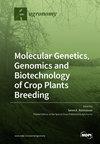温室和田间生长条件对藜麦野生种质对盐胁迫响应的影响
IF 3.3
2区 农林科学
Q1 AGRONOMY
引用次数: 1
摘要
藜麦具有非凡的耐高盐能力,为解决盐胁迫带来的农业挑战提供了一个很有前途的解决方案。本研究旨在探讨盐胁迫对三种藜麦材料(18GR、R-132和DE-1)的影响,并比较温室和田间生长条件对其耐盐性的影响。用50、100、150和200mM浓度的NaCl灌溉植物。结果表明,藜麦植物对形态、生理、生化和酶参数的反应受到NaCl浓度、加入量、生长条件及其相互作用的影响。随着盐度灌溉的增加,所有研究材料的地上部分长度和叶面积显著减少(p<0.05),这与植物光合参数有关。与田间栽培相比,温室条件能促进更快、更旺盛的生长,叶面积更大。此外,在200 mM浓度下,DE-1的加入表现出更高的光合活性,在温室和露地条件下分别记录了195.66±3.56和120±1.13µmol·m−2·s−1的值。在这两种条件下,NaCl对所有材料的MDA和H2O2都有刺激作用,DE-1材料表现出最低的水平。蛋白质、糖、脯氨酸、过氧化物酶、抗坏血酸过氧化物酶和过氧化氢酶都受到盐胁迫的刺激,R-132登录除外。田间栽培导致了更严重的盐度反应。温室条件可以提高藜麦的耐盐性,因为生长条件要求较低。DE-1表现出最高的耐盐性,而R-132表现出最低。这项研究为进一步研究各种藜麦材料耐盐性的遗传基础奠定了基础,通过农业实践优化了含盐地区的生长,并在可持续农业的现实条件下证实了所获得的结果。本文章由计算机程序翻译,如有差异,请以英文原文为准。
The Impact of Greenhouse and Field Growth Conditions on Chenopodium quinoa Willd Accessions’ Response to Salt Stress: A Comparative Approach
Quinoa’s exceptional capacity to tolerate high salt levels presents a promising solution to the agricultural challenges posed by salt stress. This study aimed to explore salt stress effects on three quinoa accessions (18 GR, R-132, and DE-1) and to compare the influence of greenhouse and field growing conditions on their salinity tolerance. The plants were irrigated by 50, 100, 150, and 200 mM NaCl concentrations. The results showed that quinoa plants’ response to morphological, physiological, biochemical, and enzymatic parameters was influenced by NaCl concentration, accession, growing conditions, and their interactions. As salinity irrigation increased, aerial part length and leaf area decreased significantly (p < 0.05) for all studied accessions, correlating with plant photosynthetic parameters. Greenhouse conditions promote faster and more vigorous growth with a larger leaf area compared to field cultivation. Furthermore, at 200 mM concentration, the DE-1 accession displayed greater photosynthetic activity, recording values of 195.66 ± 3.56 and 120 ± 1.13 µmol·m−2·s−1 for greenhouse and open field conditions, respectively. NaCl stimulated MDA and H2O2 in both conditions for all accessions, and the DE-1 accession displayed the lowest levels. Proteins, sugars, proline, peroxidase, ascorbate peroxidase, and catalase were stimulated by salt stress, except in the R-132 accession. Field cultivation resulted in a more severe salinity response. Greenhouse conditions may enhance quinoa’s salt tolerance due to the less demanding growth conditions. DE-1 exhibited the highest salt tolerance, while R-132 showed the lowest. This study sets the stage for further research into the genetic basis of salt tolerance in various quinoa accessions, optimizing growth in salty regions through farming practices, and confirming the obtained results in real-world conditions for sustainable agriculture.
求助全文
通过发布文献求助,成功后即可免费获取论文全文。
去求助
来源期刊

Agronomy-Basel
Agricultural and Biological Sciences-Agronomy and Crop Science
CiteScore
6.20
自引率
13.50%
发文量
2665
审稿时长
20.32 days
期刊介绍:
Agronomy (ISSN 2073-4395) is an international and cross-disciplinary scholarly journal on agronomy and agroecology. It publishes reviews, regular research papers, communications and short notes, and there is no restriction on the length of the papers. Our aim is to encourage scientists to publish their experimental and theoretical research in as much detail as possible. Full experimental and/or methodical details must be provided for research articles.
 求助内容:
求助内容: 应助结果提醒方式:
应助结果提醒方式:


